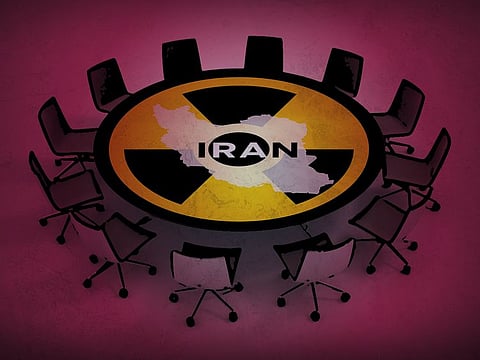Will a nuclear deal in Vienna mark a new chapter for the region?
Much at stake for Iran and rest of the world as Tehran continues talks with the EU, US

There is a sense of renewed optimism in Vienna after a bad week of negotiations that ended with the US and the EU accusing Tehran of presenting new conditions while walking away from compromises that were agreed to last June. As the seventh round of talks resumes, it now appears that Russia and China had put pressure on Iran to recommit to earlier pledges. On Friday the Iranian delegation expressed readiness to resume talks on the basis of what was agreed to in previous rounds.
After a pause of more than four months, following the swearing in of a new Iranian president, the Iranians are back in Vienna, but not after accelerating the activities of their nuclear programme with little oversight by the IAEA. The lack of inspections had angered the Americans and Europeans, while pushing the Israelis to renew claims that Tehran was only buying time and that its end game is to build a nuclear arsenal.
A new round of talks between Iran, the US and the EU began on Thursday to try to revive the 2015 deal limiting the programme, from which the US withdrew under Donald Trump in 2018. US President Joe Biden has indicated he is willing to return to the agreement, but the US has accused Iran of backsliding on previous talks.
An ironclad commitment
Iran now says it is ready to make a deal but insists on the lifting of sanctions and of getting an ironclad commitment from the US that it will not withdraw from the agreement in the future. In both cases Tehran is making a solid case. For the Biden administration what Donald Trump had done, by withdrawing unilaterally from the 2015 Joint Comprehensive Plan of Action (JCPOA), he has sabotaged much of its foreign policy agenda. Its main objective now is to recalibrate the US geopolitical priorities, especially in the Middle East.
A number of Arab countries are realising that there is a limit to what the US can do with regard to Iran. Such pragmatism can be seen in the recent UAE-Iran talks and in rounds of negotiations taking place between Saudi Arabia and Iran under Iraqi mediation. But that is not to say that Iran’s nuclear activities are the only thing on the mind of regional leaders.
Yes we want to see Iran committed to a peaceful nuclear programme with international inspections. Iran’s regional agenda has destabilised the region and its neighbours do not like the way it is meddling in their own domestic affairs.
In many ways an international deal with Iran on the nuclear issue, along with opening direct talk with Tehran by its neighbours, may have positive results regarding Iran’s regional behaviour. The two tracks should go together and Washington should support efforts by its regional allies to establish lines of communication with Tehran.
By the same logic Iran’s leaders must come to the realisation that arriving at a deal in Vienna should launch a new chapter in its relationship with its neighbours. They should end the perception of their regime as an international and regional pariah. Such a new beginning could bring peace to Iraq, Syria and Yemen for starters where Iran has clout.
A reduced US involvement in the region may end up being a good thing. Already yesterday’s foes are talking to each other and realising that there is a need to end a culture of political and sectarian polarisation as well as establishing a policy of good neighbourhood. By the end of the day the people of this region, including the Iranian people, deserve a better life and opportunities for progress.
Of course the current sense of optimism in Vienna may also dissipate over a detail here or a detail there. There may be cyberattacks against Iranian sites that could derail the talks. The US has already warned against aggravating Iran through such attacks, as well as remote drone strikes, that do not help its negotiators in Vienna.
There is much at stake for Iran and the rest of the world and so a deal could still be possible before the end of the year. Iran has stacks of domestic challenges and its people are not happy. A deal that ends the sanctions could be a much needed reprieve for the regime and citizens.
Osama Al Sharif is a journalist and political commentator based in Amman.
Sign up for the Daily Briefing
Get the latest news and updates straight to your inbox



